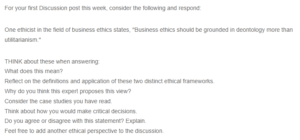Business Ethics-Deontology and Utilitarianism
Deontology and utilitarianism refer to the underlying motives that influence business actions. On the one hand, deontology implies that a business’s actions are solely controlled by the desire to make a positive impact on communities (Tseng & Wang, 2021). On the other hand, when businesses practice utilitarianism, they base their actions on a cost-benefit analysis. In other words, a business may move jobs from one country to another if the net job gains outweigh job losses.
Based on these definitions, businesses that apply deontology approach every action with the right motives before considering the implications of such actions on the company. Such reasoning originates from human morality values (Tseng & Wang, 2021). On the other hand, the decision-making process in utilitarianism does not consider the welfare of individual households but rather the net societal benefit.
The expert proposes this view in light of changes in the global business environment. Unlike in the past, consumers now consider the corporate social responsibility of businesses before patronizing them. Businesses that ignore the public good will end up losing customers. Most ethical scenarios faced by most companies put legal considerations against moral considerations. Some actions may be legal but immoral because they cause welfare loss. Businesses that pursue utilitarianism may not care about the negative impacts of such actions in society as long as they are legal. Therefore, seeking deontology will ensure no public harm while businesses undertake their operations. A relevant example of these ethical perspectives is when motor vehicle companies fail to withdraw faulty cars. The companies weigh the benefits and losses of recalling the vehicles and decide not to place them. Such actions often result in uncalled-for human suffering.
References
Tseng, P.-E., & Wang, Y.-H. (2021). Deontological or Utilitarian? An Eternal Ethical Dilemma in Outbreak. International Journal of Environmental Research and Public Health, 18(16), 8565. https://doi.org/10.3390/ijerph18168565
ORDER A PLAGIARISM-FREE PAPER HERE
We’ll write everything from scratch
Question 
For your first Discussion post this week, consider the following and respond:
One ethicist in the field of business ethics states, “Business ethics should be grounded in deontology more than utilitarianism.”

Business Ethics-Deontology and Utilitarianism
THINK about these when answering:
What does this mean?
Reflect on the definitions and application of these two distinct ethical frameworks.
Why do you think this expert proposes this view?
Consider the case studies you have read.
Think about how you would make critical decisions.
Do you agree or disagree with this statement? Explain.
Feel free to add another ethical perspective to the discussion.